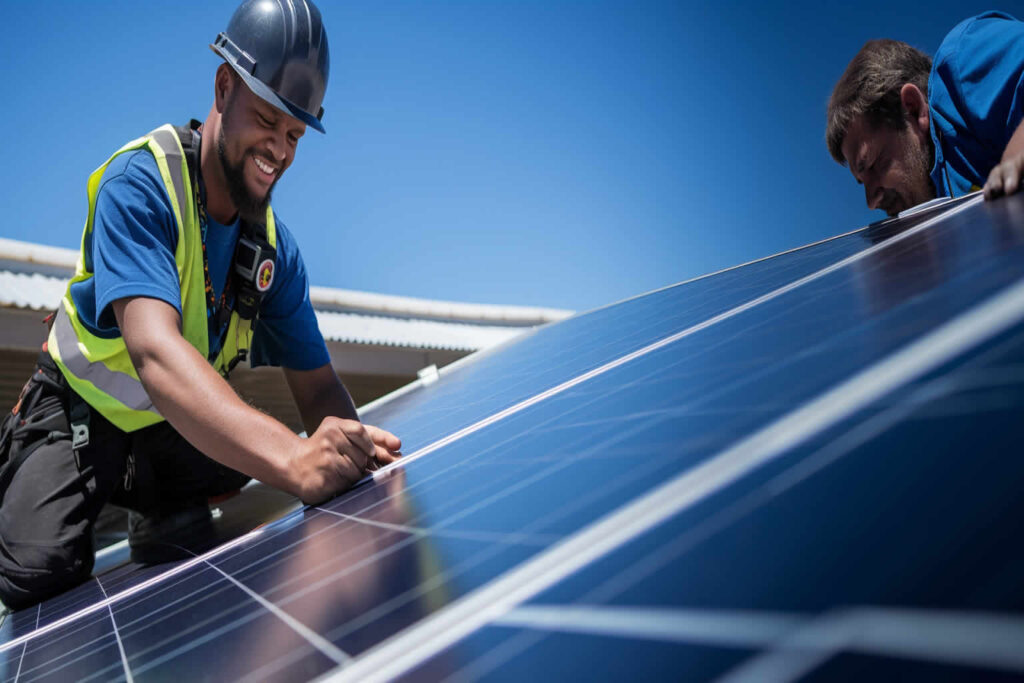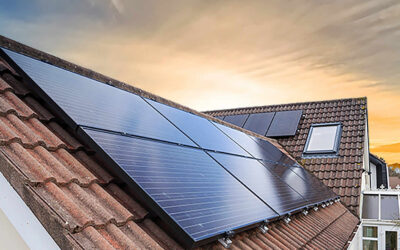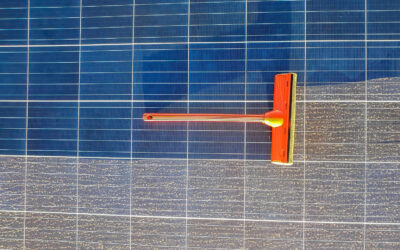The Need for Solar Panel Cleaning in South Africa’s Rising Solar Revolution

In the shadows of frequent power outages, South Africa is illuminating a path towards home-manufactured electricity solutions. Eskom, the state-owned power utility, manages an Energy Available Factor (EAF) of just 52%, plunging South Africans into darkness for around 11 hours daily. This dire situation has amplified the nation’s transition to solar energy, with installations seeing a dramatic rise. Yet, as the sun shines on this promising venture, a cloud looms over – the paucity of proficient solar panel cleaning services.
Dirty solar panels are more than an eyesore; they’re a dent in efficiency. Influenced by factors like age, shade, and cleanliness, panels can experience an efficiency dip of a startling 35%. Even on the lower end, a 10-15% drop is detrimental, particularly when batteries, the priciest components of solar installations, can’t charge to their full capacity. As the nation grapples with its energy needs, the relevance of solar panel cleaning becomes starkly evident.
To understand better, let’s explore the top five questions surrounding solar panel cleaning:
1. Why is cleaning vital for solar panel efficiency?
Solar panels operate on a fundamental principle: converting sunlight into electricity. At its core, the process is about capturing as many photons as possible to stimulate electrons and produce electric current. A clean surface ensures unhindered access to sunlight, optimizing this conversion process.
Dirt, debris, bird droppings, and other pollutants, when accumulated on the panel surface, act as a blockade. They obstruct the light rays, reducing the number of photons that can interact with the panel’s cells. Consequently, the energy production drops. Think of it like trying to see through a dirty window; the view is clouded, and the amount of light coming through is reduced.
For solar panels, even a thin layer of dust can have a significant impact. In regions prone to dust storms, sand, or high pollution levels, like many parts of South Africa, this accumulation can be rapid and substantial. The fallout? Reduced panel efficiency, leading to decreased energy production and, in turn, increased energy costs.
Moreover, specific contaminants can be corrosive over time, potentially leading to long-term damage to the panel surfaces. This degradation not only affects their performance but also shortens their operational lifespan, leading to earlier-than-anticipated replacements and increased costs.
Lastly, it’s essential to note the exponential nature of these losses. A day or two of reduced efficiency might seem negligible. However, when these minor efficiency reductions are compounded over weeks, months, or years, the overall energy loss becomes significant. For homeowners, businesses, or any entity reliant on solar power, this translates to missed opportunities in energy savings, and in the broader perspective, hinders South Africa’s mission to combat energy shortages.
In essence, cleaning isn’t just about aesthetics or short-term efficiency. It’s a pivotal step in guaranteeing the longevity, optimal functioning, and economic viability of solar panels.
2. How often should solar panels be cleaned?
Solar panels, while touted for their low-maintenance nature, do require regular cleaning to maintain peak efficiency. However, the frequency of cleaning is not a one-size-fits-all answer. Several factors determine how often one should engage in this task.
- Geographical Location and Climate: Different areas have different levels of dust, pollen, and potential pollutants. For instance, if you’re situated in a dry and dusty region of South Africa, the panels may require more frequent cleaning compared to those in a less dusty, coastal region. Similarly, areas prone to frequent rainfalls might naturally benefit from the rain serving as a cleanser, albeit not always effective against stubborn residues.
- Angle of Installation: Panels installed at a steeper angle might have the advantage of allowing debris to slide off more easily. Conversely, those at a shallow angle might accumulate dirt and dust faster.
- Local Environment: If you’re located near highways, factories, or areas with heavy construction, expect more grime and pollution. Conversely, living close to forests or green belts might increase the risk of bird droppings or tree sap.
- Seasonal Factors: Certain seasons can contribute more to the dirt. For instance, spring may bring more pollen, while construction-heavy summer can bring more dust.
- Energy Production Monitoring: Regularly monitoring your solar panel’s energy production can offer insights. If there’s a sudden drop in power output, it might be time for a cleaning session.
Considering these factors, while general advice suggests cleaning solar panels at least once or twice a year, those in high-dirt environments might benefit from quarterly cleanings. At the same time, some homeowners might find that an annual cleaning is sufficient, especially if environmental conditions are favorable.
However, it’s also essential to strike a balance. Overcleaning, especially if not done properly, could risk damaging the panels. The key is to be observant, monitor panel performance, and adjust cleaning schedules based on tangible data and environmental factors.
3. Is tap water adequate for cleaning solar panels?
Solar panels, with their intricate designs and vital role in harnessing renewable energy, demand special care during cleaning. One might wonder if the readily available tap water is up to the task. Let’s delve into the complexities surrounding this question.
- Composition of Tap Water: Typical tap water is not just H2O. It contains a myriad of minerals like calcium, magnesium, and sometimes even trace amounts of metals and salts. When tap water evaporates, especially under the sun, these minerals remain and can create streaks or spots on the surface of the solar panels. Over time, these deposits, commonly known as hard water stains, can accumulate and become challenging to remove.
- Potential for Residues: The residues left by tap water can hinder the effectiveness of solar panels. By acting as a barrier between the sun’s rays and the photovoltaic cells, these minute residues can compound over time, gradually decreasing the panel’s efficiency.
- Comparison with Other Waters: Deionized or purified water is often a preferred choice for cleaning solar panels. Why? Such water is stripped of its impurities and minerals, leaving virtually no residue upon evaporation. Some professional cleaning services also employ reverse osmosis water for cleaning solar panels due to its high purity levels.
- Other Considerations: While the water type plays a significant role, the cleaning method and tools are equally crucial. Even with purified water, using abrasive tools or harsh chemicals can damage the panels. Thus, a gentle approach with a soft cloth, sponge, and mild cleaning solution is recommended, irrespective of water type.
While tap water can be used in a pinch, it’s not the ideal choice for maintaining the pristine condition of solar panels. For homeowners serious about maximizing the lifespan and efficiency of their solar investment, considering purified or deionized water, along with proper cleaning techniques, is the way forward.
4. What potential risks accompany solar panel cleaning?
Solar panel cleaning, though vital for maintaining efficiency, can come with its own set of challenges. The task might seem straightforward, but there are underlying risks that homeowners and professionals alike should be aware of. Here’s a closer look at the potential pitfalls associated with solar panel cleaning:
- Physical Damage to the Panels: Solar panels are durable, but they’re not invincible. Using abrasive materials, brushes with hard bristles, or even applying too much pressure can scratch the panel’s surface. These scratches can impede the panel’s ability to capture sunlight effectively, leading to a drop in efficiency.
- Electrical Hazards: Water and electricity are a perilous combination. If the solar system isn’t properly shut down during cleaning, there’s a risk of electrical shock. Moreover, water seeping into cracks or damaged parts of the panel can lead to short circuits or system malfunctions.
- Slips and Falls: Climbing roofs and elevated platforms poses an inherent risk. Wet surfaces increase the chance of slips and falls, making it imperative for those cleaning to wear proper footwear and use safety gear.
- Chemical Residue: Some might be tempted to use strong detergents or chemical cleaners to tackle stubborn grime. However, these chemicals can leave a residue, decreasing panel efficiency. Additionally, they could harm the panel’s protective coating, rendering it more susceptible to future dirt accumulation.
- Improper Cleaning Techniques: Inefficient cleaning can lead to streaks and patches that obstruct sunlight. Not only does this defeat the purpose of cleaning, but it can also make future cleaning sessions more labor-intensive.
- Environmental Concerns: Using non-eco-friendly detergents or excessive amounts of water can have a detrimental impact on the environment. Runoff from cleaning can enter soil and water systems, causing pollution and harm to local ecosystems.
In light of these risks, it’s clear that solar panel cleaning is not just about aesthetics or efficiency but also about safety and sustainability. Whether you’re a homeowner looking to maintain your investment or a professional in the solar cleaning industry, understanding and mitigating these risks ensures not only the longevity of the solar panels but also the safety of those involved in the cleaning process.
5. What sets professional cleaning services like CoolBlast apart?
In the realm of solar panel maintenance, not all cleaning services are made equal. While DIY approaches might seem cost-effective, they can’t match the expertise, tools, and techniques offered by professional services. CoolBlast, a name gaining traction in the solar panel cleaning sector, exemplifies the benefits of choosing a seasoned player. Here’s why entrusting your solar panel cleaning to professionals like CoolBlast makes a world of difference:
- Specialized Equipment: CoolBlast utilizes state-of-the-art equipment designed explicitly for solar panel cleaning. Their tools ensure a thorough clean without causing any damage, preserving the integrity and efficiency of the panels.
- Expertise & Training: The team at CoolBlast isn’t just about elbow grease. They undergo rigorous training to understand the nuances of solar panel systems. This knowledge ensures that every cleaning session is both safe and effective.
- Eco-Friendly Solutions: CoolBlast is acutely aware of the environmental implications of their work. Hence, they employ eco-friendly cleaning agents that not only protect the solar panels but also ensure that no harmful runoffs endanger the environment.
- Safety Protocols: With the inherent risks of solar panel cleaning, safety can’t be overstated. CoolBlast’s team adheres to stringent safety guidelines, using protective gear and safety equipment to prevent accidents and ensure a risk-free cleaning experience.
- Tailored Cleaning Plans: CoolBlast recognizes that each solar installation is unique. Their tailored cleaning plans cater to specific needs, ensuring optimal performance and longevity for every individual solar system.
- Efficiency Guarantee: Backed by research and experience, CoolBlast promises an enhancement in solar panel efficiency post-cleaning. Their comprehensive approach ensures that panels are not just cleaner but also better performing.
- Reliable Aftercare: Beyond just cleaning, CoolBlast provides guidance on maintaining solar panels, offering tips and insights that can prolong the intervals between professional cleaning sessions.
In an era where sustainable energy solutions are paramount, maintaining solar panel efficiency is crucial. While there’s no shortage of cleaning services on the market, CoolBlast’s holistic approach, backed by expertise and cutting-edge tools, sets them leagues apart. Their commitment not just to clean panels, but to a greener planet and satisfied clientele, underscores their position as industry frontrunners.
Conclusion
South Africa’s solar transition is commendable, but like all technologies, solar panels require meticulous care. Efficient cleaning not only boosts their performance but also prolongs their lifespan, ensuring a sustainable, brighter future. With informed choices and expert assistance, the nation can effectively navigate the intricacies of solar maintenance, truly capitalizing on the sun’s abundant potential.


Recent Comments